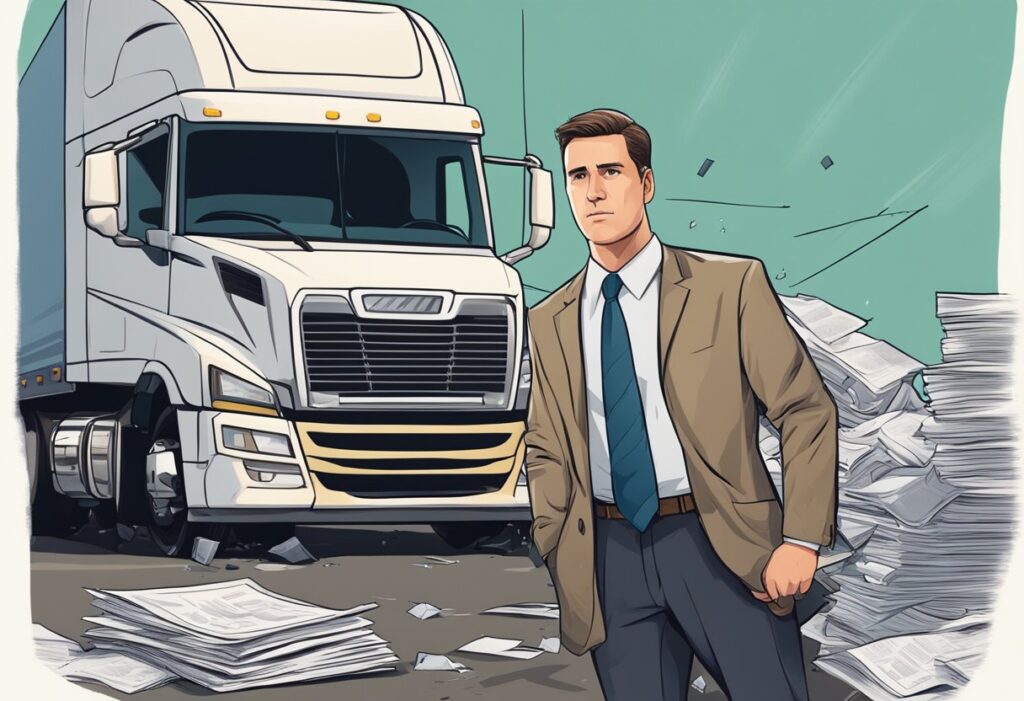Big Rig Accident Lawyer: What You Need to Know
Big rig accidents can be devastating, resulting in serious injuries, property damage, and even fatalities. These accidents are often caused by driver error, equipment failure, or poor road conditions. If you or a loved one has been involved in a big rig accident, it’s important to understand your legal options and seek the help of a qualified big rig accident lawyer.
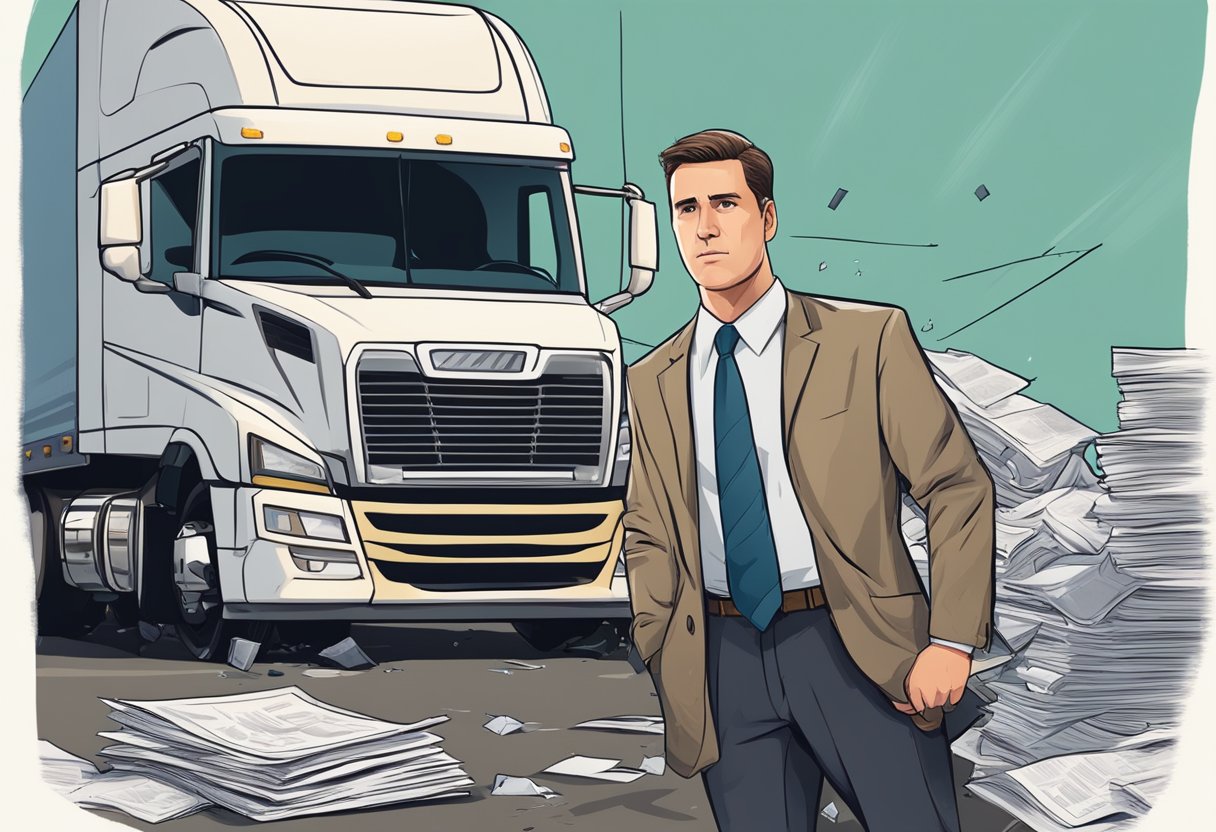
A big rig accident lawyer is a legal professional who specializes in representing clients who have been involved in big rig accidents. They have the knowledge and experience to navigate the complex legal system and help their clients get the compensation they deserve. Whether you were a driver, passenger, or pedestrian involved in a big rig accident, a lawyer can help you understand your rights and options.
Key Takeaways
- Big rig accidents can be devastating and result in serious injuries, property damage, and fatalities.
- A big rig accident lawyer specializes in representing clients involved in big rig accidents and can help navigate the legal system.
- If you’ve been involved in a big rig accident, it’s important to seek the help of a qualified lawyer to understand your rights and options.
Understanding Big Rig Accidents
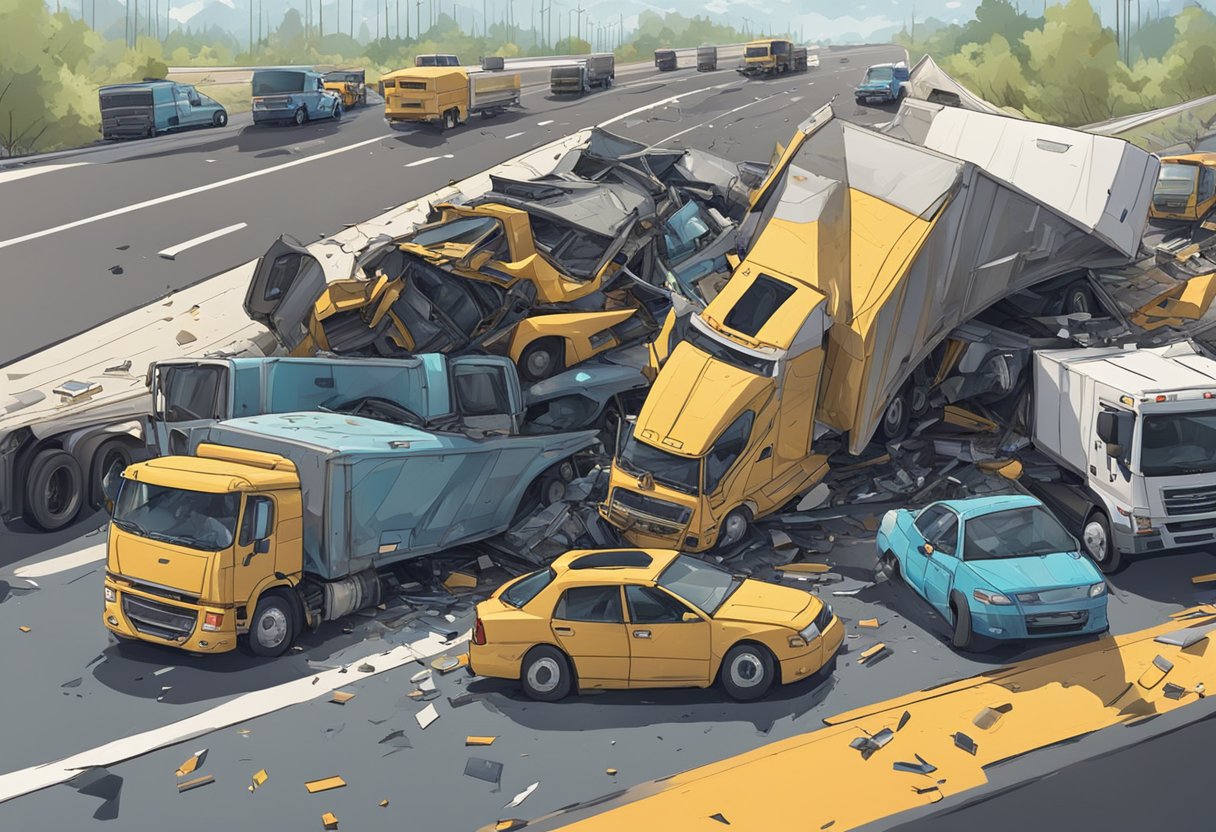
Causes of Big Rig Accidents
Big rig accidents can be caused by a variety of factors. Some common causes include driver error, equipment failure, and weather conditions. Driver error can include things like fatigue, distracted driving, or driving under the influence of drugs or alcohol. Equipment failure can include things like brake failure, tire blowouts, or steering problems. Weather conditions can also play a role in big rig accidents, especially when roads are slick or visibility is poor.
Federal and State Regulations
Federal and state regulations play an important role in preventing big rig accidents. The Federal Motor Carrier Safety Administration (FMCSA) sets regulations for commercial motor vehicles, including big rigs. These regulations include rules about driver qualifications, hours of service, and vehicle maintenance. States also have their own regulations for big rigs, which can vary from state to state.
It is important for big rig accident lawyers to be familiar with these regulations in order to determine whether a violation may have contributed to an accident. Violations of these regulations can be used as evidence in a lawsuit to show that a driver or company was negligent and should be held responsible for the accident.
Overall, understanding the causes of big rig accidents and the regulations that govern them is crucial for both preventing accidents and holding negligent parties accountable.
Choosing a Big Rig Accident Lawyer

When it comes to choosing a big rig accident lawyer, it’s important to find someone who has the right qualifications and experience to handle your case. Here are some key factors to consider:
Qualifications to Look For
First and foremost, you’ll want to make sure your lawyer is licensed to practice law in your state. Beyond that, look for a lawyer who has experience specifically with big rig accidents and personal injury cases. This might include experience with trucking companies, knowledge of federal and state trucking regulations, and a track record of success in similar cases.
You may also want to consider a lawyer who is part of a larger firm with resources to handle complex cases, or one who has a network of experts in fields such as accident reconstruction and medical treatment.
Questions to Ask Potential Lawyers
When you’re evaluating potential lawyers, be sure to ask questions that can help you determine whether they’re a good fit for your case. Here are a few key questions to consider:
- What is your experience with big rig accident cases?
- How do you typically handle cases like mine?
- What is your success rate with cases like mine?
- Who will be handling my case, and how can I contact them?
- What are your fees, and how are they structured?
By asking these and other relevant questions, you can make an informed decision about which big rig accident lawyer is right for you.
The Legal Process
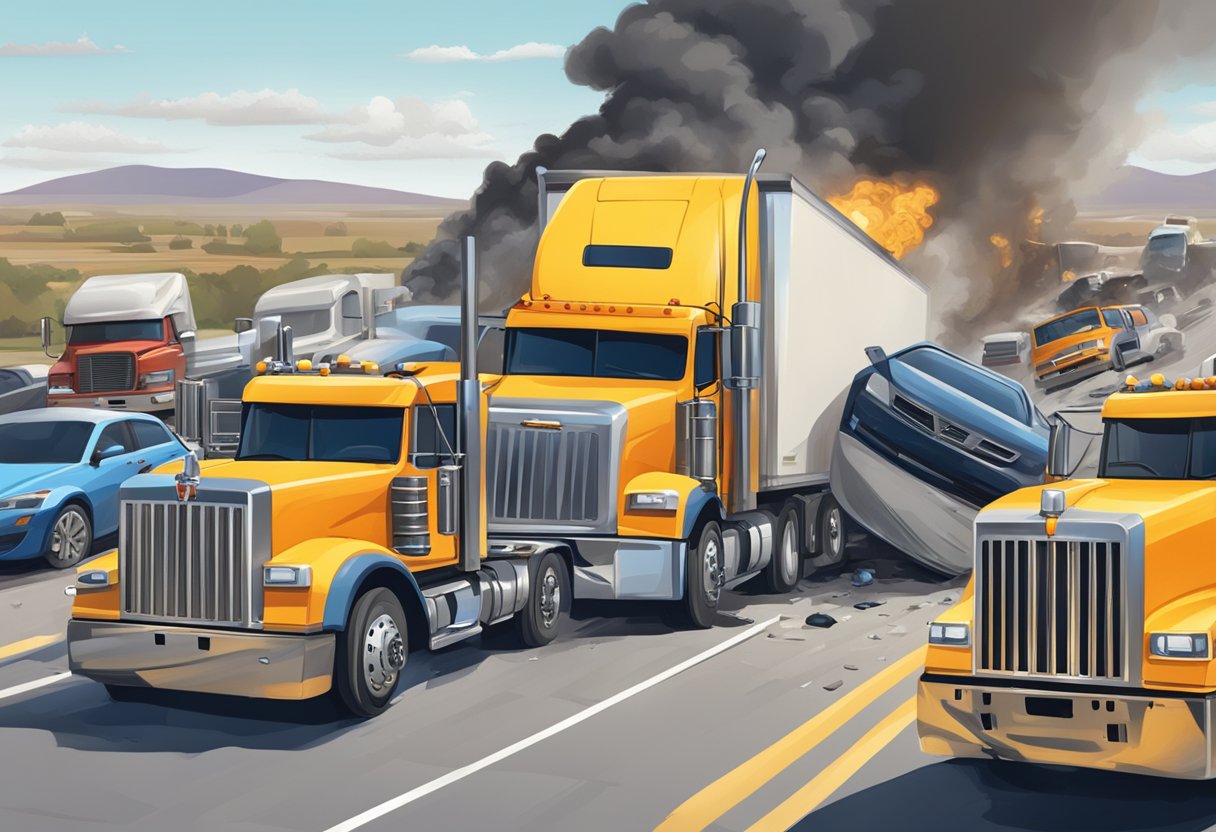
Filing a Claim
When a person is involved in a big rig accident, the first step in the legal process is to file a claim. This involves notifying the insurance company of the trucking company or the driver of the big rig. The claim should include all relevant information about the accident, such as the time and location of the accident, the parties involved, and any injuries sustained.
Investigation and Evidence Gathering
After the claim is filed, the next step is to investigate the accident and gather evidence. This involves obtaining police reports, witness statements, and any other relevant information that can help build a strong case. The big rig accident lawyer will work closely with investigators to gather evidence and build a case.
Settlement Negotiations
Once the evidence is gathered, the big rig accident lawyer will negotiate a settlement with the insurance company. The goal is to reach a fair settlement that compensates the victim for their injuries, medical expenses, lost wages, and other damages. The lawyer will work to ensure that the settlement covers all of the victim’s expenses and losses.
Trial Procedures
If a settlement cannot be reached, the case may go to trial. The big rig accident lawyer will prepare for trial by gathering additional evidence, interviewing witnesses, and preparing arguments. During the trial, the lawyer will present evidence and make arguments to convince the judge or jury that the victim deserves compensation for their injuries and losses.
Overall, the legal process for a big rig accident can be complex and time-consuming. However, with the help of an experienced big rig accident lawyer, victims can receive the compensation they deserve.
Compensation and Damages
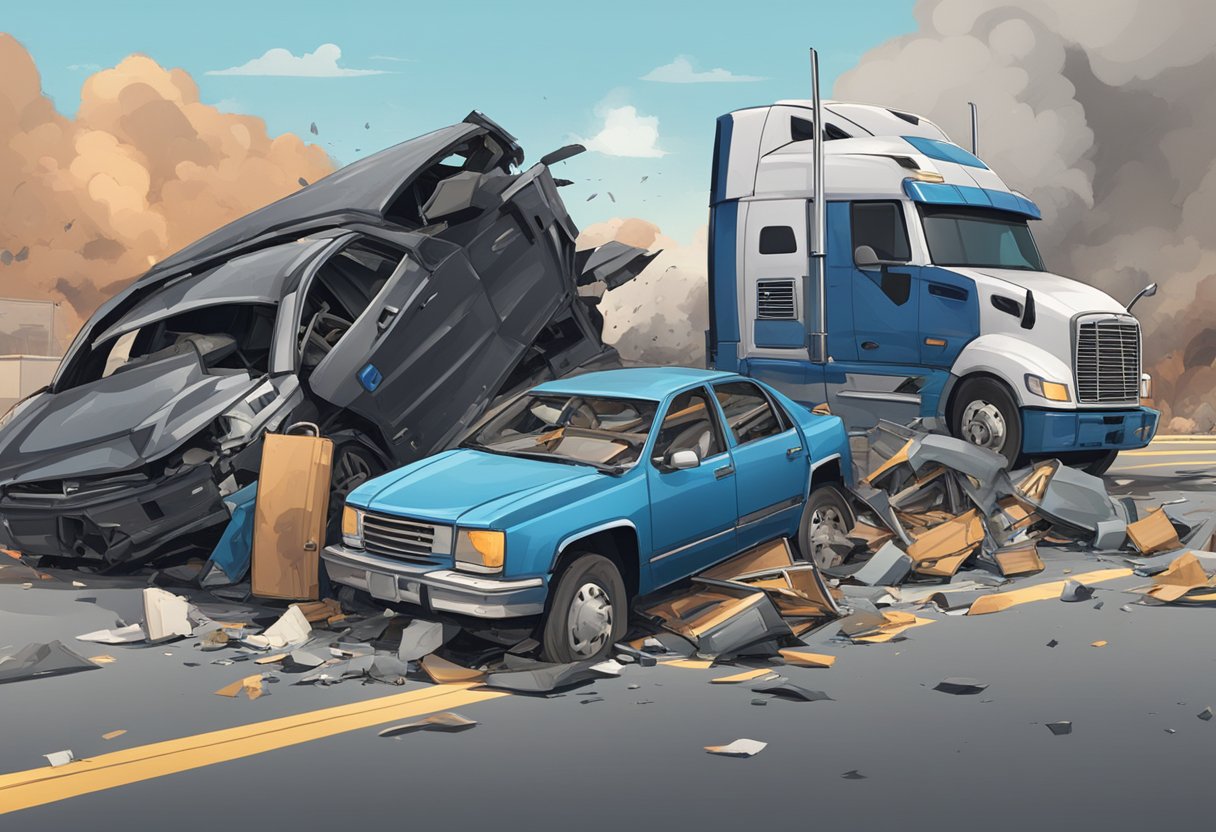
Types of Recoverable Damages
In a big rig accident case, victims may be entitled to various types of recoverable damages, depending on the circumstances of the accident. Some of the most common types of recoverable damages include:
- Medical expenses: This includes the cost of hospitalization, surgeries, medication, and other medical treatments required as a result of the accident.
- Lost wages: If a victim is unable to work due to their injuries, they may be entitled to compensation for the wages they would have earned during that time.
- Pain and suffering: This includes compensation for the physical pain and emotional distress caused by the accident.
- Property damage: If a victim’s property, such as their car, was damaged in the accident, they may be entitled to compensation for the cost of repairs or replacement.
- Punitive damages: In some cases, victims may be entitled to punitive damages if the truck driver or trucking company acted recklessly or intentionally.
Calculating Compensation
Calculating compensation in a big rig accident case can be complex, as it involves taking into account a variety of factors, such as the severity of the injuries, the cost of medical treatment, and the impact of the injuries on the victim’s life. To determine the appropriate amount of compensation, a lawyer may consider factors such as:
- The cost of medical treatment, including both current and future expenses.
- The extent of the victim’s injuries and how they impact their ability to work and enjoy life.
- The victim’s age, occupation, and overall health.
- The extent of the truck driver’s negligence or recklessness.
By taking these factors into account, a lawyer can help ensure that their client receives the compensation they deserve for their injuries and other losses.
Common Injuries in Big Rig Accidents
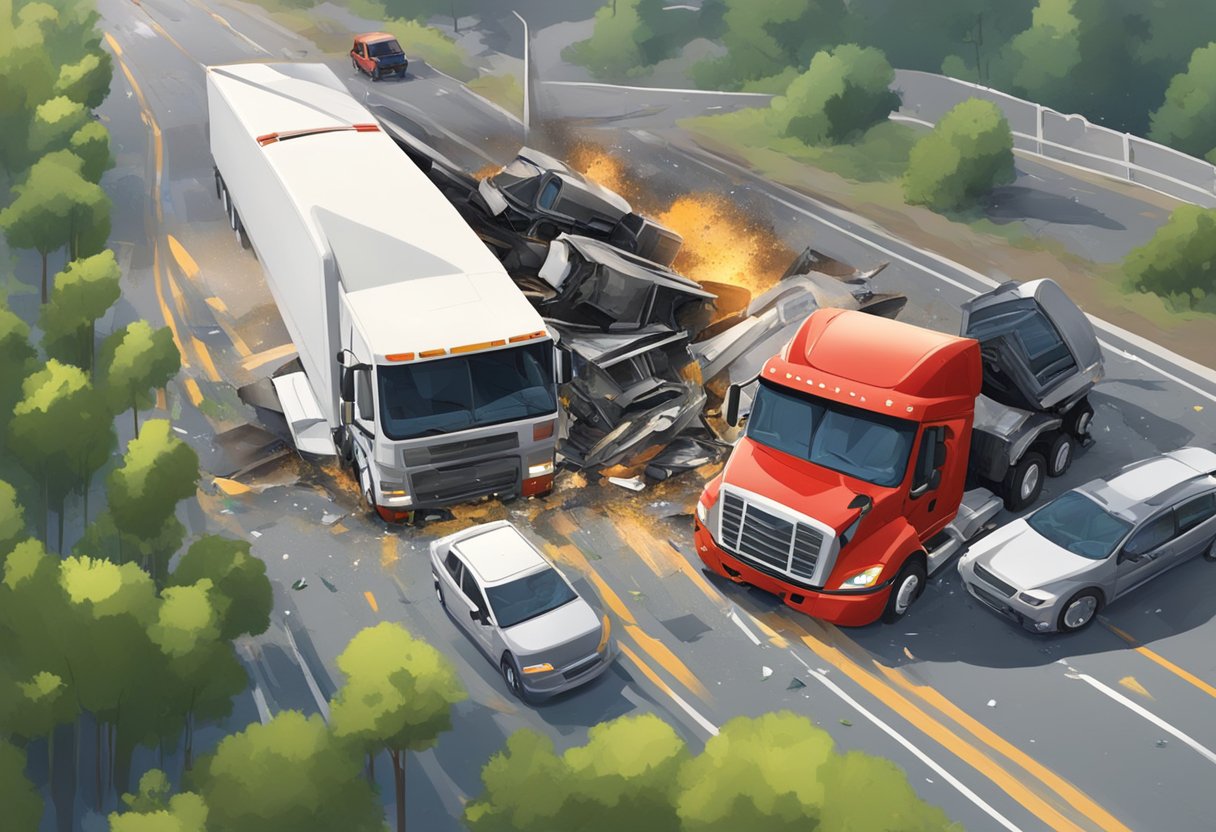
Immediate and Long-Term Impact
Big rig accidents can result in serious injuries for all parties involved. Due to the size and weight of big rigs, the impact of a collision can be devastating. Here are some common injuries that may occur in big rig accidents:
Immediate Impact
- Traumatic Brain Injuries (TBIs): TBIs are a common injury in big rig accidents due to the force of impact. Symptoms may include headaches, dizziness, and loss of consciousness.
- Spinal Cord Injuries: Spinal cord injuries can result in paralysis, loss of sensation, and loss of muscle function.
- Broken Bones: Fractures and broken bones are common in big rig accidents due to the force of impact.
Long-Term Impact
- Chronic Pain: Injuries sustained in big rig accidents can result in chronic pain that lasts for months or even years.
- Emotional Distress: Big rig accidents can be traumatic and result in emotional distress such as anxiety and depression.
- Disability: Injuries sustained in big rig accidents can result in permanent disability, limiting a person’s ability to work and perform daily activities.
It is important to seek medical attention immediately following a big rig accident, even if you don’t feel any pain. Some injuries may not be immediately apparent and can worsen over time if left untreated. A big rig accident lawyer can help you get the compensation you deserve for your injuries and other damages.
Preventive Measures and Safety Tips
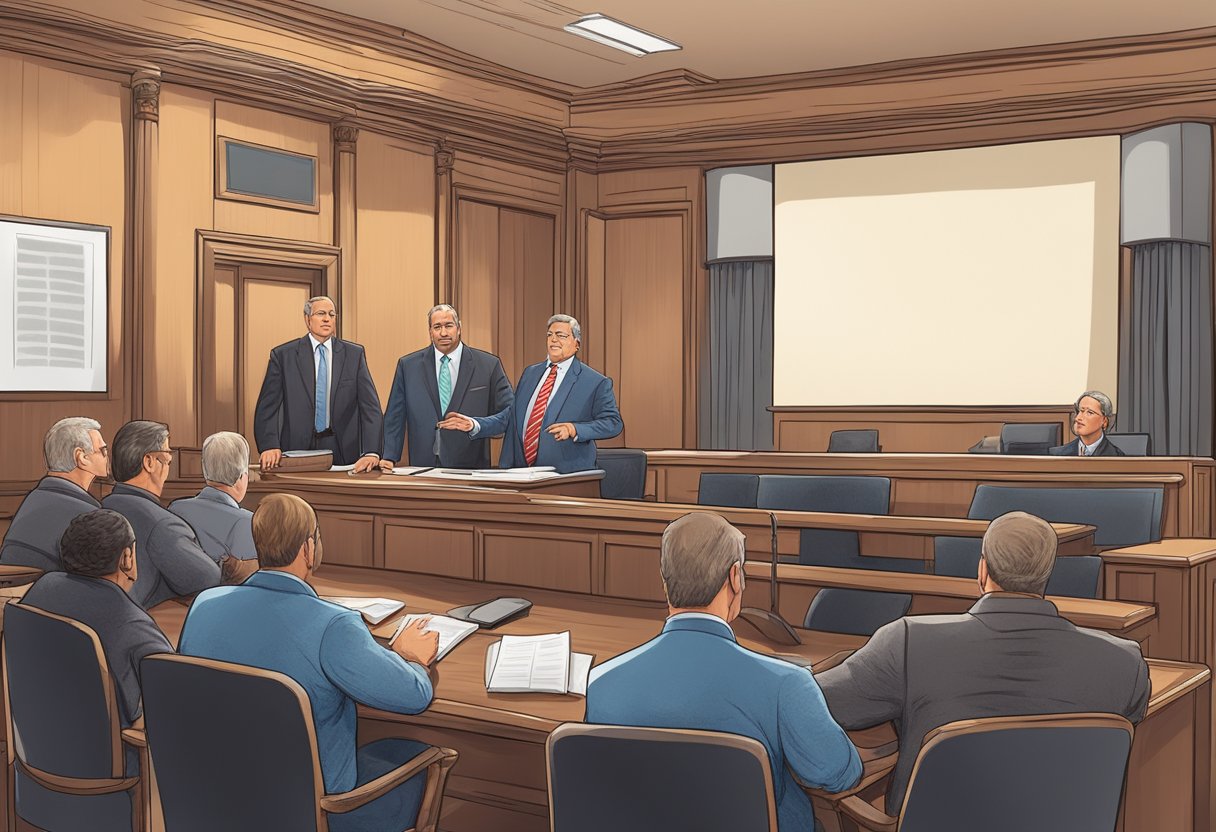
When it comes to big rig accidents, prevention is always better than cure. Here are some preventive measures and safety tips that can help reduce the risk of big rig accidents:
- Regular maintenance: Big rig drivers should ensure that their vehicles are regularly maintained and undergo routine inspections. This includes checking the brakes, tires, lights, and other important components.
- Proper loading: Overloading can increase the risk of accidents, so it’s important to ensure that the cargo is properly secured and distributed. It’s also important to ensure that the cargo weight is within the legal limits.
- Driver training: Big rig drivers should undergo proper training and certification before hitting the road. This includes training on how to handle the vehicle, how to navigate different road conditions, and how to respond to emergencies.
- Avoid distracted driving: Distracted driving is a major cause of accidents, so big rig drivers should avoid using their phones or engaging in other distractions while driving.
- Observe traffic rules: Big rig drivers should always observe traffic rules and regulations. This includes obeying speed limits, using turn signals, and maintaining a safe following distance.
- Be aware of blind spots: Big rigs have large blind spots, so drivers should be aware of these blind spots and take extra precautions when changing lanes or merging.
By following these preventive measures and safety tips, big rig drivers can help reduce the risk of accidents and keep themselves and other road users safe.
Case Studies and Precedents
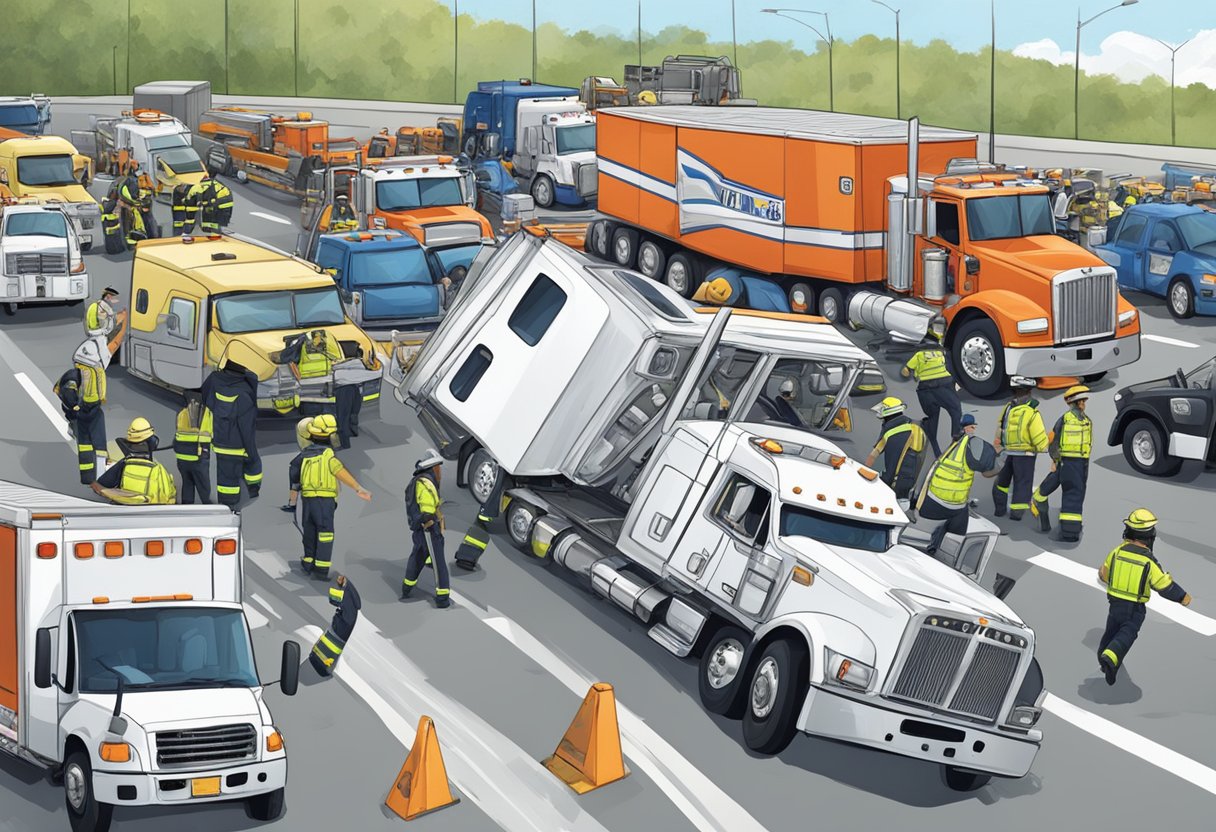
Big rig accidents can have devastating consequences, resulting in serious injuries or even fatalities. In such cases, victims or their families may seek compensation for damages incurred. To build a strong case, it is important to have a knowledgeable and experienced big rig accident lawyer who can use case studies and precedents to support their arguments.
One such case study is the 2014 accident involving a big rig and a school bus in California. The accident resulted in the deaths of ten people, including five high school students. The families of the victims sought compensation for wrongful death and received a settlement of $10 million. This case serves as a precedent for future big rig accident cases involving wrongful death claims.
Another important case study is the 2016 accident involving a big rig and a passenger vehicle in Arizona. The driver of the passenger vehicle suffered severe injuries and filed a lawsuit against the big rig driver and the trucking company. The case went to trial, and the jury found the big rig driver and the trucking company liable for the accident, awarding the victim $2.3 million in damages. This case demonstrates the importance of holding negligent big rig drivers and trucking companies accountable for their actions.
In addition to case studies, there are also legal precedents that can be used to support big rig accident cases. For example, the Federal Motor Carrier Safety Administration (FMCSA) has established regulations governing the operation of commercial motor vehicles, including big rigs. These regulations can be used to demonstrate negligence on the part of the big rig driver or trucking company, such as failure to properly maintain the vehicle or failure to comply with hours-of-service requirements.
Overall, case studies and legal precedents can be powerful tools in building a strong case for victims of big rig accidents. A knowledgeable and experienced big rig accident lawyer can use these resources to support their arguments and help victims receive the compensation they deserve.
Frequently Asked Questions
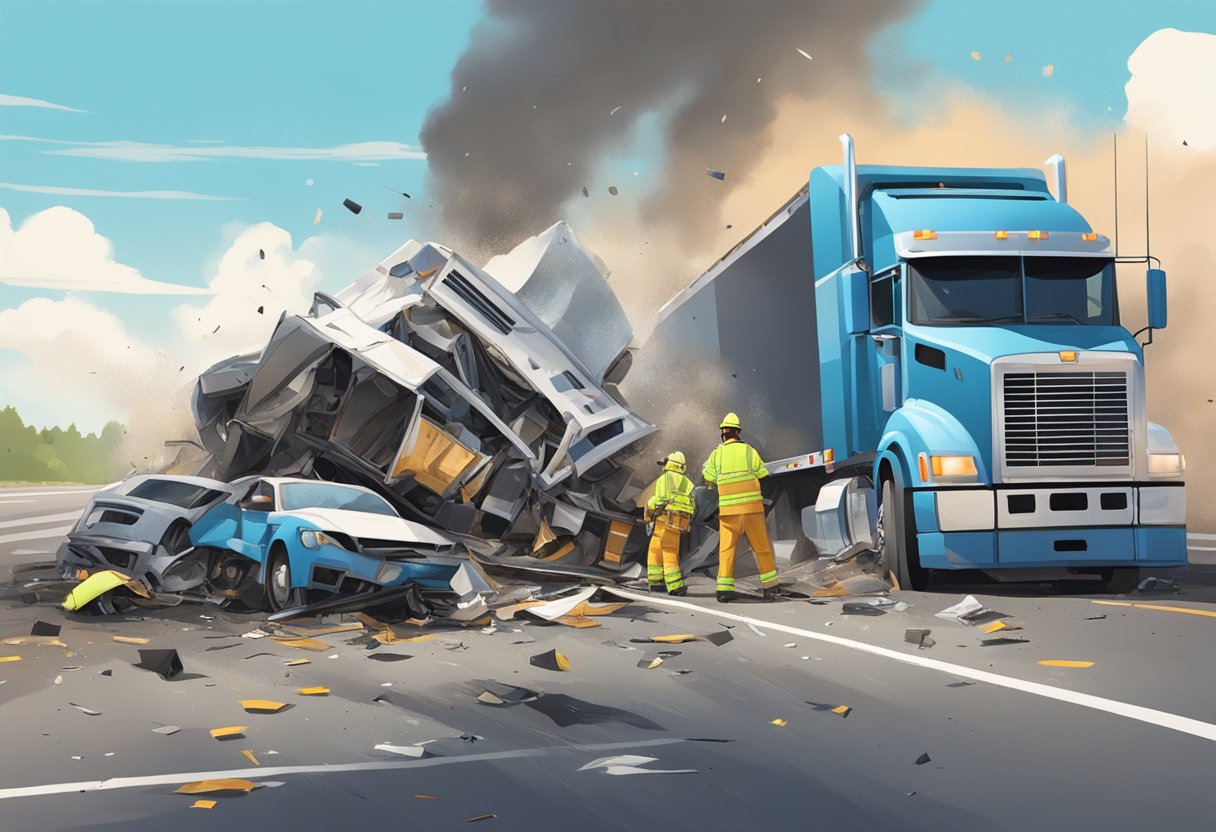
What should I do immediately following a truck accident?
If you are involved in a truck accident, it is important to seek medical attention right away, even if you don’t think you are injured. You should also call the police and report the accident. Take photos of the accident scene and get the contact information of any witnesses. Do not admit fault or discuss the accident with anyone except the police.
How is liability determined in a commercial trucking accident?
Liability in a commercial trucking accident is determined by investigating the accident and gathering evidence. This evidence can include police reports, witness statements, and data from the truck’s black box. Liability can be shared between multiple parties, including the truck driver, the trucking company, and other drivers on the road.
What types of compensation can I seek after a truck accident?
If you are injured in a truck accident, you may be able to seek compensation for medical expenses, lost wages, pain and suffering, and property damage. In some cases, you may also be able to seek punitive damages if the truck driver or trucking company acted recklessly or intentionally.
How long do I have to file a lawsuit after a truck accident?
The statute of limitations for filing a lawsuit after a truck accident varies by state, but it is typically between one and three years. It is important to consult with a truck accident lawyer as soon as possible to ensure that you do not miss the deadline for filing your claim.
What are the common causes of accidents involving big rigs?
Some common causes of accidents involving big rigs include driver fatigue, speeding, distracted driving, improper maintenance, and overloaded or improperly secured cargo.
How does a lawyer help in negotiating with trucking companies’ insurance?
A truck accident lawyer can help negotiate with the trucking company’s insurance to ensure that you receive fair compensation for your injuries and damages. They can also help gather evidence to support your claim and represent you in court if necessary.

